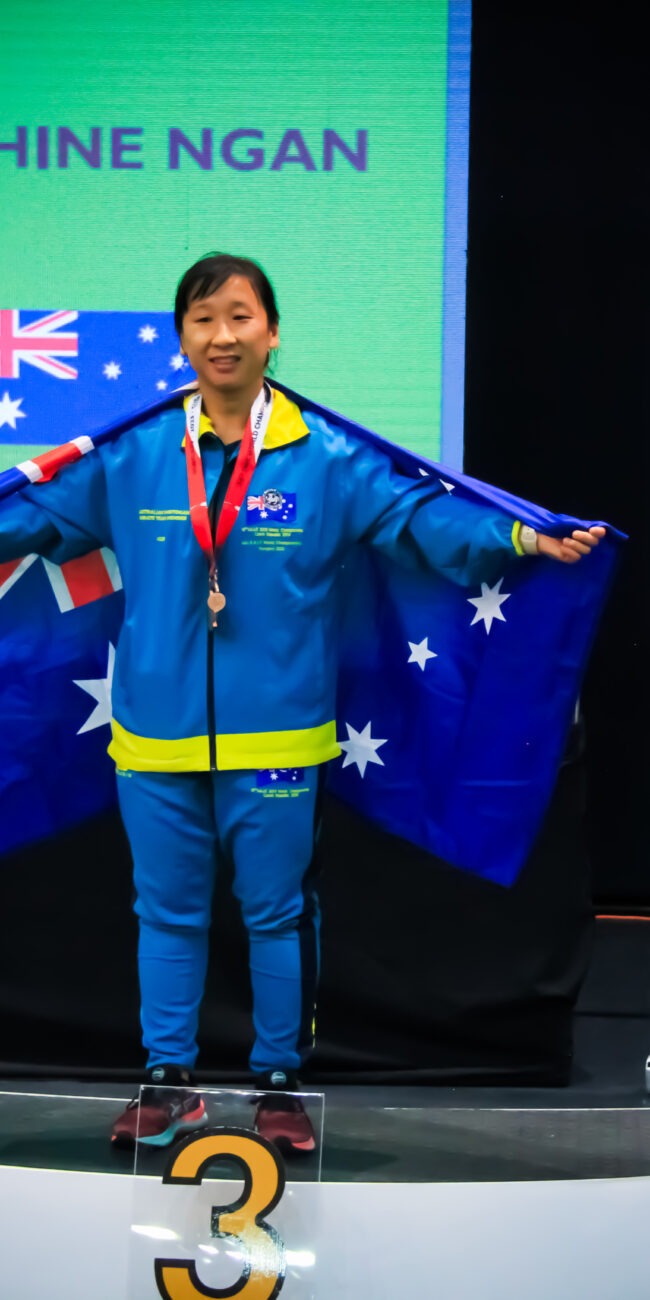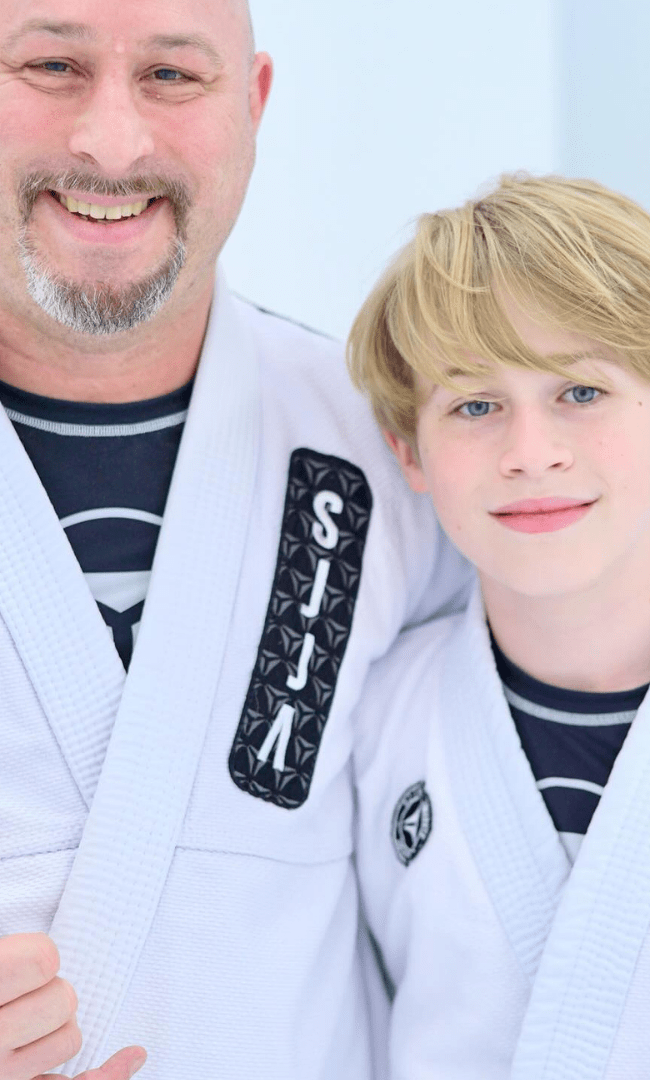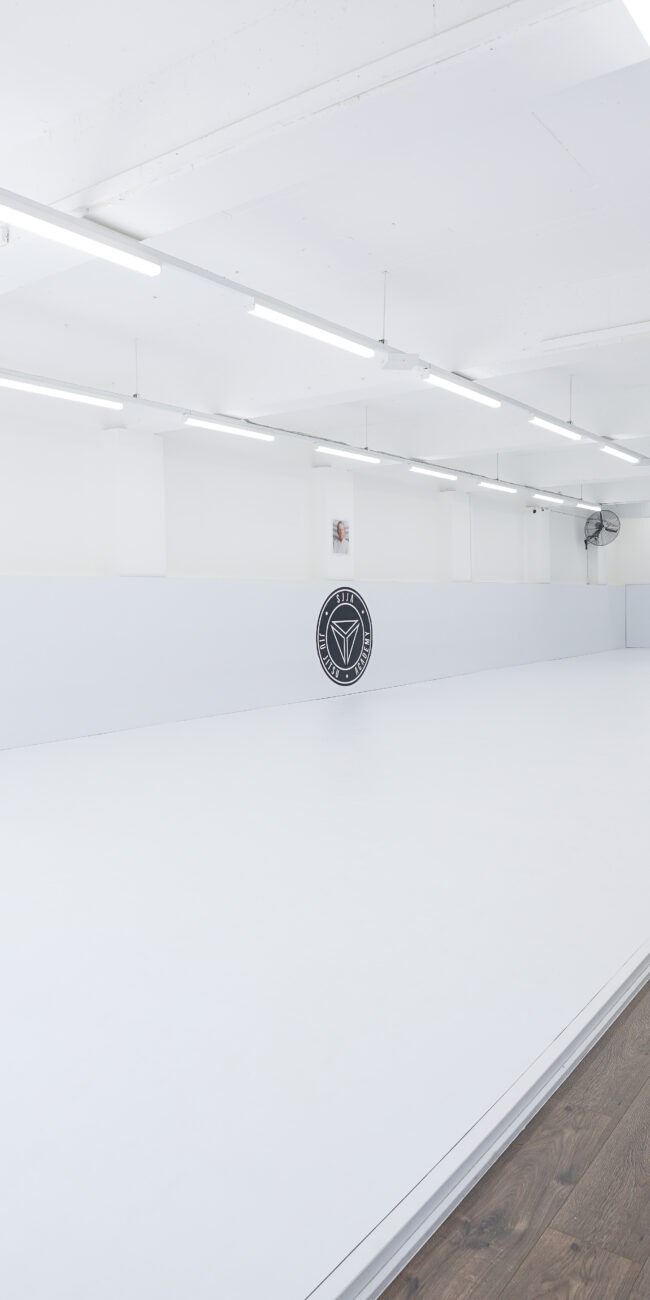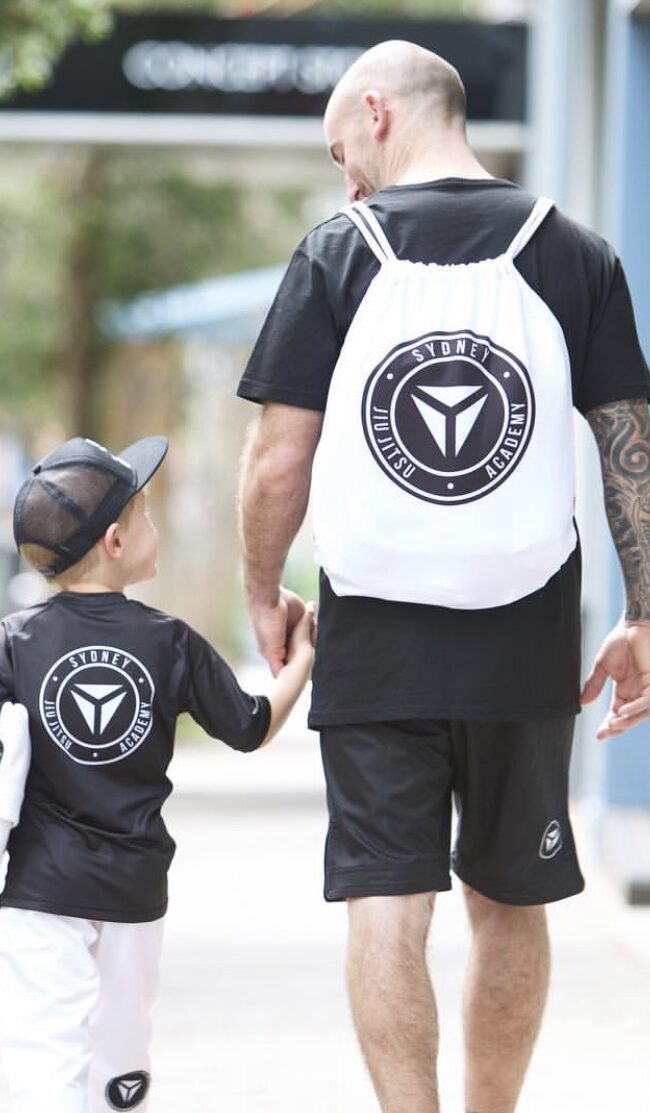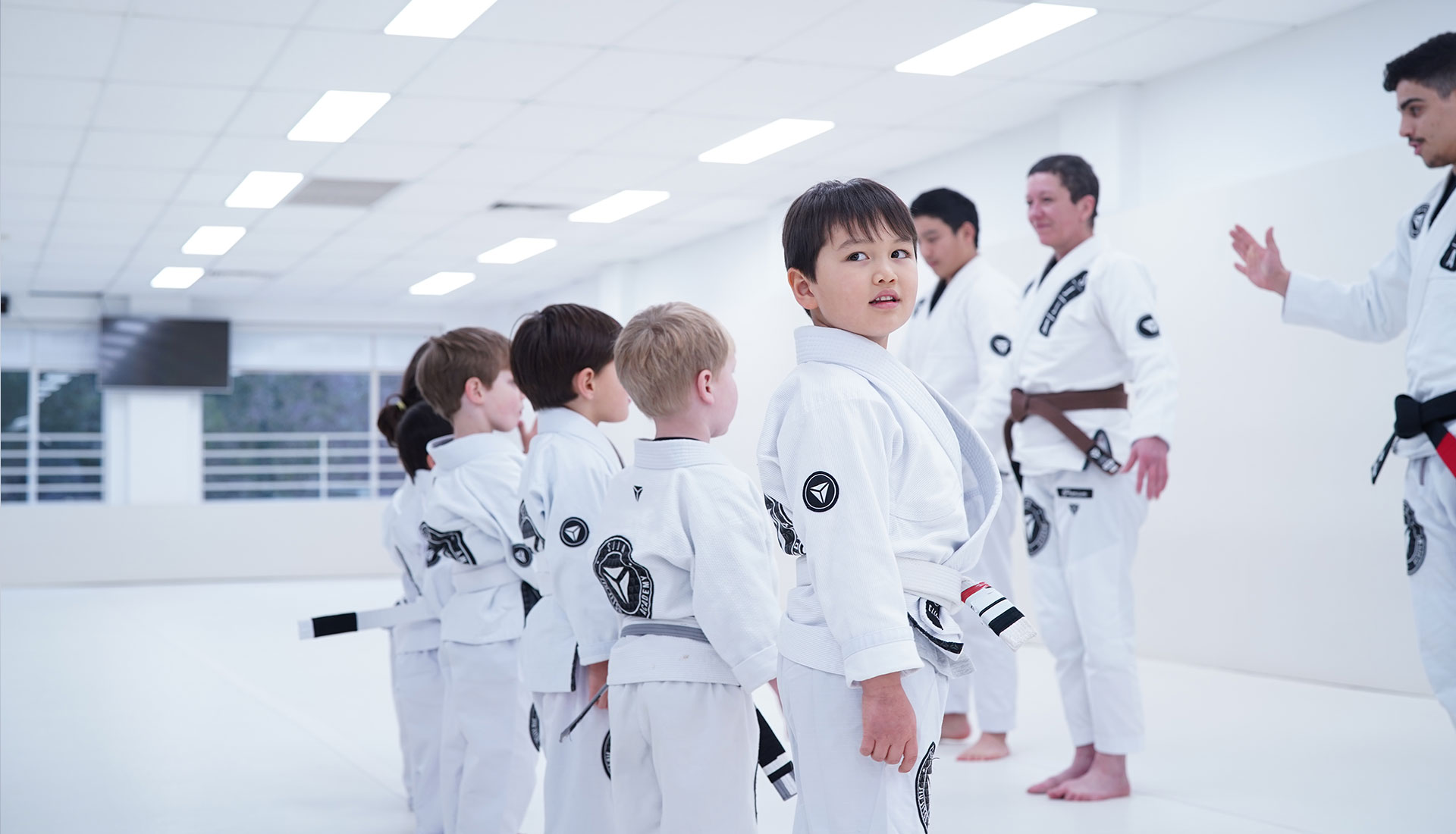
We sat down with some of SJJA’s kids coaches to hear why they think jiu-jitsu is so valuable for kids, along with their personal approach to teaching children. We also hear from a few parents of SJJA on how jiu-jitsu has positively impacted their children’s lives – in particular, their confidence, mentality, discipline and focus at school.
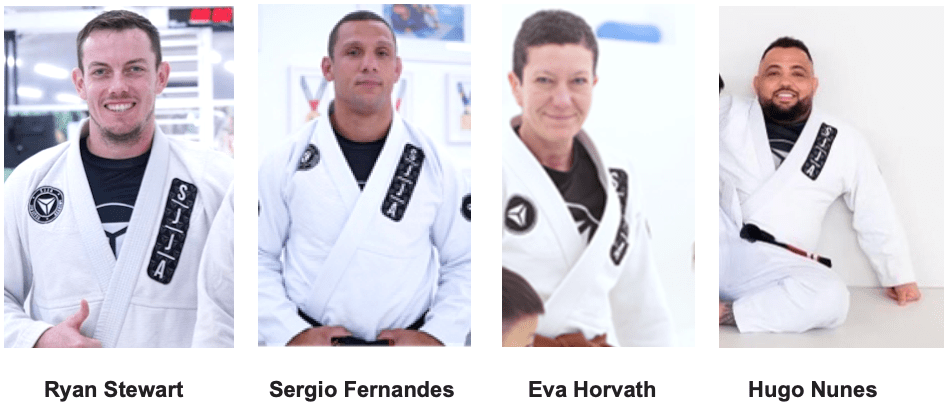
Interview with SJJA’s Kids Coaches
Why do you think jiu jitsu is so great for kids?
Ryan: Jiu jitsu is important for kids as it helps them establish some basic values that they can implement throughout their lives. Some that are important in my eyes are:
(a) winning isn’t always possible, but trying your best is;
(b) patience is a virtue, and you need this in order to achieve anything;
(c) showing up is the first step to success, but the next step is to plan, re-evaluate, strategise and then implement;
(d) much of what it takes to be successful on the mat is the same as what it takes off the mat.
Hugo: I believe jiu jitsu is great for kids for so many reasons, but mainly for self understanding about their life, body mechanics, how to show respect towards all people and how to deal with bullying at school.
Sergio: It’s so great for kids because it helps so much with their self-esteem and confidence, and they also learn about teamwork and how to show respect for everyone.
Eva: Jiu-Jitsu is the best sport for kids. It teaches them discipline, confidence, how to make friends, and how to deal with getting bullied at school.
What’s the most rewarding aspect of teaching kids for you personally?
Ryan: The most rewarding aspect for me is in passing on life skills through the art of jiu-jitsu. On the mats, we emphasise obedience, attentiveness, kindness, fortitude, and benevolence. These skills that are learnt through jiu-jitsu are valuable on the mats, but more importantly, they shape how you treat your parents and peers away from the mats. To see kids inherit these behaviours is very rewarding.
Sergio: When some kids start their jiu-jitsu journey, they are sometimes really shy and closed off, and sometimes feel like “I can’t do this”. It’s a slow process, but when you see these kids start to understand the techniques, train hard, challenge themselves and cross their limits, and see them respecting the instructor and other kids, it makes me feel like my job is amazing.
Eva: For me the most rewarding thing in teaching kids is to see them improve, win medals in competitions, and seeing how proud their parents are of them. We also build a special bond with the kids and parents, and that is priceless.Hugo: To see the joy in their faces and happiness for me is priceless!
How do you define success when working with kids?
Ryan: The definition of success when working with kids is to teach them something, see them imitate that skill, then ultimately create something superior to your original teaching. It’s simple: our job is to share, and their job is to expand – like everything, if the formula is good it will continue to evolve.
Hugo: Success for me is when I see them having a lot of fun while learning the techniques.
Eva: Success for me is when the kids come back to the next class and they show you the techniques they’ve been practising at home that we taught them in the previous class.
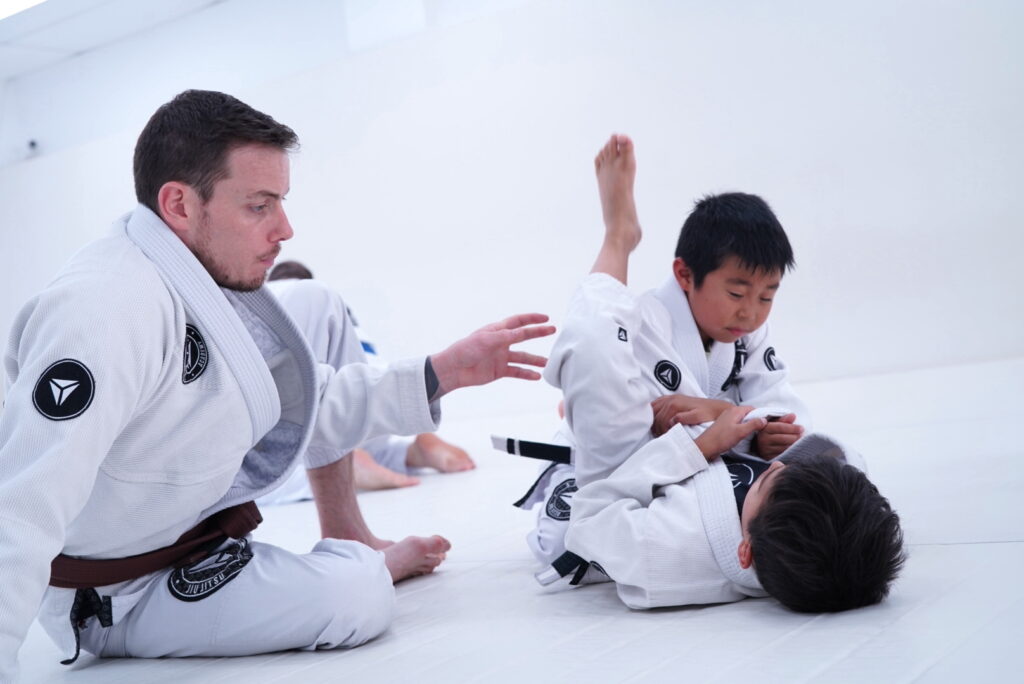
What are the most notable transformations you’ve seen in some of your younger students?
Hugo: I’ve seen some of my students go from being super shy and antisocial, to becoming the leader in the classroom (in an extremely positive way).
Sergio: I recall one student in particular who was very difficult to train: he would come to the class but would never train. So in each class, I’d try to talk to him, hold his hand to guide him along, do the training with him, and over time he started to feel very secure and safe next to me, and started to practice every exercise with me. I spoke to his dad throughout this, and told him that I realised kids need to just feel safe to do something, and that as soon as this boy felt safe, his entire personality changed. He started being really proactive, and he also started demonstrating to his little sister the same techniques I did with him. She was also really afraid at the start, so he started mimicking my approach: he would hold her hand, guide her onto the mats, and slowly train with her, and she too became more confident over time.
Eva: For me the most inspiring story is one of our girls: she was 3 years old when she started with us. She didn’t do anything we asked her to do, never spoke, was very shy, and would make sounds as if she was hurting, even in the warmups. I thought she wouldn’t last a week… now she’s a yellow belt, winning every competition. She has also made so many friends here, and is always talking to us coaches – it’s been a complete change in every aspect, and it’s amazing to see.
Ryan: The most notable transformation I’ve witnessed of late is the kids are learning how to think, analyse, and evaluate for themselves. Some of the kids are so talented already, but now they are expanding beyond their physical talent and learning how to analyse and solve problems independently.
How old were you when you first started training jiu-jitsu? What made you want to start?
Ryan: Before starting BJJ, I already had numerous years of striking (ie. wing chun, taekwondo, and muay thai) under my belt. There was a clear crossover in certain aspects of the striking martial arts, which made it relatively easy to pick up, but for some reason, I hadn’t ever really given the grappling arts much consideration. It wasn’t until I was 23: I returned from training Muay Thai in Thailand to discover a close friend had started training jiu-jitsu – we exchanged ideas and from there I became really interested in implementing this art into my life, so I attended my first class and from there I was hooked!
Eva: I tried Japanese Jiu-Jitsu when I was 30 years of age – one of my friends dragged me to my first class and I absolutely loved it. I just wish I had started when I was a kid!
Sergio: I started BJJ when I was 23 years old. I was a professor (black belt equivalent) in capoeira at the time and was very eager to take on a new challenge; specifically, I wanted to start training MMA and become a professional MMA fighter, which meant learning jiu-jitsu was essential. It is now my favourite martial art!
Hugo: I started when I was 9 yrs old, and it was my father who got me into jiu jitsu.
What are some changes you’ve seen in yourself, ever since you started training?
Eva: I never lacked confidence as such, but Jiu Jitsu definitely makes a huge difference in how you handle bad situations in a calm manner. I work as a surgical nurse, and a lot of my colleagues often ask me how I can be so calm when everyone else around me is so stressed. Jiu jitsu has also had a really positive impact on my fitness.
Ryan: Fortunately, I was infected with the martial arts bug from a very early age, so the foundation was in place, but I can say that with age, I have noticed all the skills I learnt on the mats (for example: how to behave and how to take on challenges) have played a big part in my everyday life off the mats. As I live my life through martial arts and jiu jitsu, I see these attributes continuing to help me take on all of life’s challenges head on.
Hugo: The main difference I’ve noticed in myself is in how I deal with daily problems. In jiu jitsu, one of the biggest things you learn is how to remain calm under pressure, analyse and solve problems.
Sergio: It’s the same in adults as it is for kids: you discover the power you have, and over time, your confidence grows. The other thing to note is that jiu jitsu encourages continuous improvement: when I reflect on myself, I can see how far I’ve come in so many different aspects of my life, and that’s in large part due to everything jiu jitsu has taught me.
What are some important things for parents of jiu jitsu students to know or keep in mind?
Ryan: The most important thing for parents to know is that we expect what they learn on the mats to be taken away from the mats and that martial arts is a rewards-based system: ultimately, what you put in is what you get out. Those who do well in Jiu-jitsu often learn exactly what it takes to be a high achiever in whatever they do outside of jiu-jitsu. Kids also learn that fighting can have grave consequences – so BJJ teaches them restraint, as well as self-control.
Hugo: I would say: aim to keep your child engaged in the sport without pressuring them too hard. At the end of the day, this is a safe and fun place for them, where they inadvertently pick up so many other important life skills outside of self defence.
Sergio: I would say: learning jiu jitsu is not about “learning to fight” per se – it’s about learning how to defend yourself and your loved ones in the unlikely event you need to. But more importantly, it’s a safe place for children to grow and socialise, and the coaches work very hard in every class to make the kids into better versions of themselves.
Eva: I would advise the parents to keep bringing the kids to the classes when we’re back, because it is for their long term benefit, and of course we miss teaching them!
What are some lessons, traditions, or games you like to incorporate in your kids’ class that you think are helpful/effective?
Sergio: I always do my animal drills: For example, I have “the frog” (which is a move to jump over the opponent’s guard), the koala, the crocodile, the wombat, and so many more! The kids love this part of the class. I also run a “King of the Mat” or “Queen of the Mat” takedown competition: when you win, you stay, and when you lose, you go to the back of the line. The kids love this because they get to practise like it’s a real competition, and they all get very competitive and work super hard to try to be the King/Queen of the Mat.
Ryan: Throughout the class I like to incorporate skills that are of value to them in the art of jiu jitsu, especially games that involve balance, reaction speed, problem solving and teamwork.
Hugo: I like to create games that incorporate body exercises whilst heading towards a team goal – that way they can combine physical fitness, jiu jitsu techniques, and at the same time, practise teamwork.
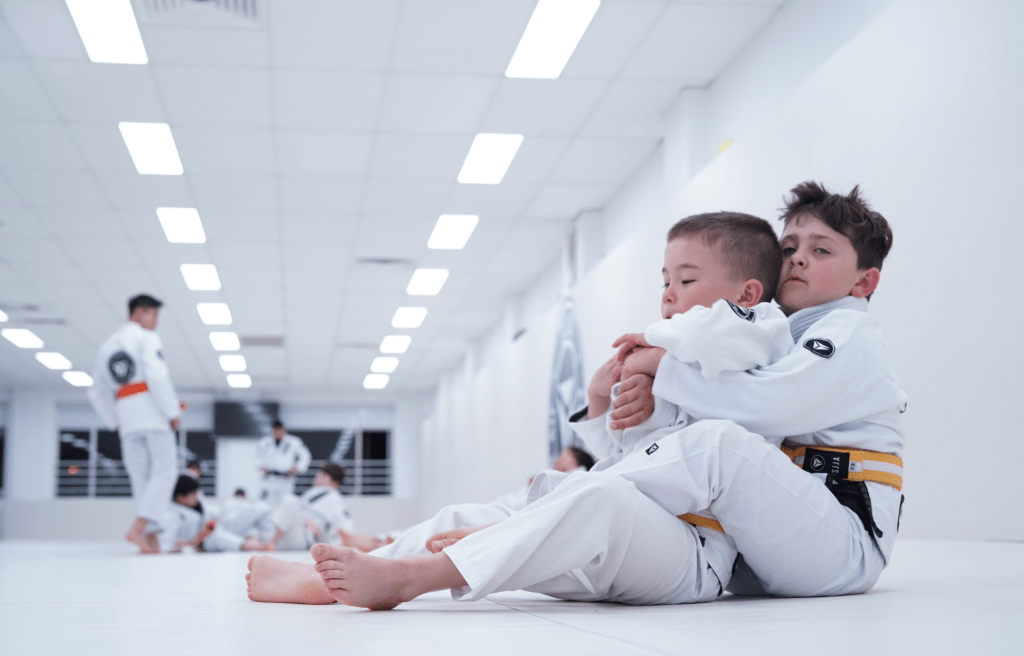
Tell us how you would handle bad behaviour in a class?
Ryan: Honestly I like to address bad behaviour with self-assessment. Firstly, I have the student evaluate their own behaviour and tell me if they think it can be improved. For instance, they rate their behaviour by selecting a score out of 10, and I also select a score out of 10 (with 10 being the best behaviour). If that number rises before class ends, we can all play a game. If it doesn’t, you risk disappointing yourself and also risk upsetting the other students in the class because of your actions. The aim of this is to teach them accountability.
Eva: It depends on the individual: sometimes a serious or angry face does the trick, and sometimes they need to be sent for a timeout or asked to stop whatever they’re doing and explain why it is not right. For me, one of these approaches always works.
Sergio: It’s a very personal thing, but I try to bring the bad behaving student under my wing and make him/her work together with me to run the class. For example, I demonstrate the technique to the class on him/her, so rather than excluding him from the class, I include them more. I learned this from having my own kids.
If I ever saw that technique didn’t work, then I usually sit the student in the corner of the class and make them think about what they did badly in the class. They then feel separated from the group and are very eager to be included again. Then I ask them if they understood what they did wrong, and ask if they want to work together with me to teach a good class. Positive reinforcement is always effective, so I always remind them: “you are a nice kid, and you are strong,” and let them know that I want them to show me and the other students these qualities.
What skills and qualities are needed to be a great BJJ coach for kids?
Sergio: You need to love what you do, and you need to be patient. If you don’t love what you do, you’re not going to love teaching kids. You also need to understand this is a child, not an adult, and most kids learn through play. If it’s too serious all the time, the kids will think it’s a boring class. When you think about it, they are learning so many new skills: balance, physical strength, strong mentality, self-confidence, and respect, but they usually aren’t conscious of this until later in life when they reflect back on their journey.
Eva: A great kids coach needs to be skilled in martial art, have charisma, and needs to know how to be in control, but also how to be playful.
Hugo: Patience, care, and consideration are key.
Ryan: Enjoying what you do for a living, remaining passionate, continuing to learn and expand your own mind and be enthusiastic to see others prevail.
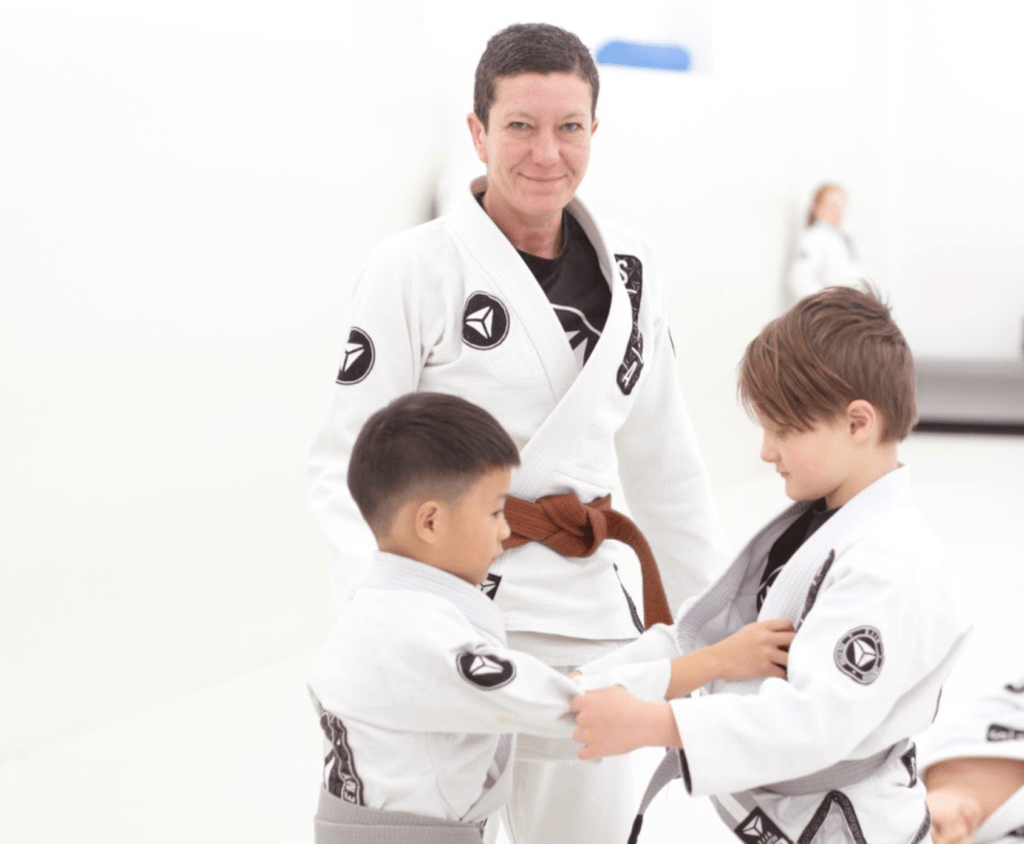
What would you say to parents who are thinking of getting their kids into jiu jitsu?
Ryan: I would tell parents that with jiu jitsu, kids have the chance to learn far more than combat skills. It’s not a seasonal sport like rugby or cricket; they don’t need to wait another year to get back into it and improve – we are open year-round. Also, unlike rugby, it doesn’t primarily rely on physical ability. In jiu jitsu, there is a place for everybody, and it’s a chance to learn so many life skills beyond what other sports teach you. In the future, your children will inevitably emulate so many values and behaviours that society looks for and rewards, as a result of everything they learned in jiu jitsu.
Hugo: Try it and watch your children progress in every aspect of their lives – even after just a few days!
Eva: I always encourage the parents to give it a try and tell them all of the benefits that Jiu-Jitsu will have on their kids: they will be strong both physically and mentally, they will learn social skills, coordination, teamwork, resilience, and so much more.
Sergio: I honestly think it is the best thing you can do for your child. The coach is going to teach your kids discipline, respect (for rules and for people), help the kids understand cooperation, teamwork, and the importance of healthy exercise. This sport really promotes a good lifestyle for kids: to eat well, sleep well, take care of your body, and stay away from drugs/alcohol, and it also makes the kids calmer, and less aggressive. A lot of people have the misconception that martial arts make kids aggressive, but it’s actually the opposite – we teach kids the right way to use their skills.
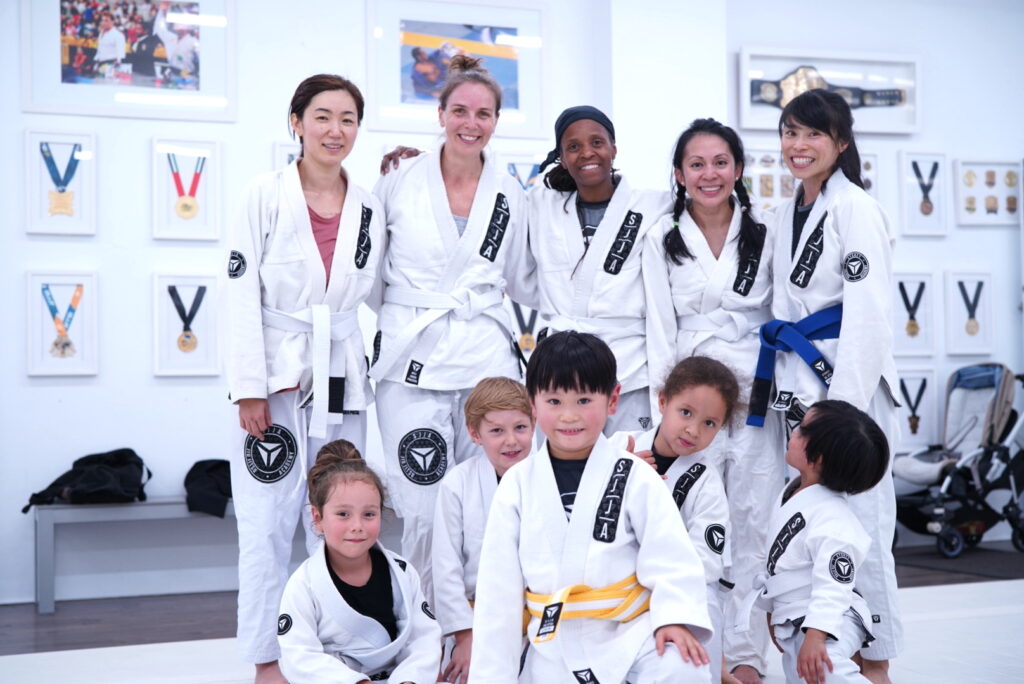
Interview with SJJA parents
What made you want to get your child/children into jiu-jitsu? Or was it your child’s idea?
Julie: Given our son Oscar is small for his age, we wanted to develop his self-confidence and ensure that he always had belief in himself and his abilities. We also wanted to build resilience and a growth mindset – to work hard and never give up on what you want in life. We felt that Jiu-Jitsu was the perfect way to teach him these values from a young age.
Jovie: We enrolled our son Matteo into BJJ when he was 5 because we wanted him to develop his confidence, discipline, focus, and to grow up being coachable. We also wanted him to know self-defence in case he ever needed it. We always tell him to ‘be good at it, so that you never have to use it’.
Why did you choose SJJA as the school for your child/children?
Julie: Friends of ours recommended Bruno and SJJA. The school has an excellent reputation, and the teachers are world class. They really are the best in the business in more ways than one. We did a trial and fell in love with the gym; the coaches were gentle giants who established strong boundaries in their kids’ classes, but they also knew when to be kind and gentle. Oscar instantly felt at home and shortly after he joined he was training every day.
Jovie: Matteo started with Gracie Barra, but we eventually moved to SJJA because we really liked their coaching style – the kids need real coaches who will give honest feedback. We also liked the firm leadership/coaching style; we think that kids need that kind of leadership figure – someone they can look up to rather than fear.
Why do you think jiu jitsu is so great for kids?
Julie: Jiu-jitsu provides a safe, structured, warm and fun place for kids to learn and grow – to become physically and mentally fit and to nurture resilience and growth as individuals. We feel that it helps and will continue to help Oscar and Clara in everything they do in their life moving forward: coordination and core strength in other sports, focus at school and determination to go after their dreams.
Jovie: BJJ is great for kids because it teaches them to think, and how to get out of difficult situations. It’s a sport that challenges and develops them mentally, physically and emotionally.
What changes have you seen in your child/children since they started training jiu-jitsu?
Julie: We have noticed that after starting jiu jitsu, both of our kids are able to concentrate and focus more at school. They also sleep better at night and are confident in their friendships. We have never had issues with bullying and we have seen them have the confidence to protect and stand up for their friends when needed. We find that it has also been very helpful in working with their self regulation and emotional maturity. The professors and coaches have provided strong guidance and are mentors in their lives. Both Oscar and Clara have a strong support network there in the friendships and sense of family they have built at SJJA over the years.
Jovie: Matteo developed confidence and patience. He was very reserved when he was younger, but after years of training, he is more open to trying new things and is never afraid to test himself. He’s also a very good sport – winning is of course important to him and losing still makes him frustrated, however, his outlook has always been to look at what he missed/lacked or did too much of and work on those areas for the next competition. And this isn’t just in BJJ – he applies it to all other competitions he engages in.
What are some important things for parents of jiu jitsu students to know or keep in mind, when their child is embarking on their jiu jitsu journey?
Julie: It’s definitely a marathon, not a sprint. We want our kids to have Jiu-Jitsu for life so it’s important to find a regular training schedule that works for the family; enough to grow but not too much where they burn out and end up leaving. 2-3 times a week works for our family and allows the kids to feel at home, make friendships as well as seeing themselves improving each week.
Jovie: It’s important for parents to acknowledge that their kids are going through a lot of learning. Parents should take a step back when kids are in training and let the coach do the coaching. This teaches the kids resilience and independence. We want our kids to be ok when we are not around, and we want them to be able to take care of themselves and make smart decisions.
What would you say to parents who are considering getting their kids into jiu jitsu?
Julie: Don’t hesitate! It’s the best decision we ever made. It will give your kids a strong foundation in self-confidence and self-belief which we believe is the best gift you could ever give them. SJJA is one of the best BJJ gyms in Australia without a doubt, and not only has highly skilled and qualified coaches and staff but is a lovely family to be a part of. Bruno and his team are not only very skilled world champions, but they are also extremely passionate about what they do and about giving back to their students. You will be in the best of hands at SJJA and we highly recommend starting ASAP.
Jovie: Jiu-jitsu is a great journey for kids (and parents). I would advise starting them as early as possible, although it is never too late for anyone to train BJJ. It’s a humble sport and it teaches a lot of life lessons, e.g. the belt system teaches them that you can’t cheat your way to success – you have to work for it. It also teaches them humility because in training you are sometimes the hammer and sometimes the nail. Either way, you always want to get back up and train again.
Are you considering getting your child/children into a martial art? Read more about our kids programs here


